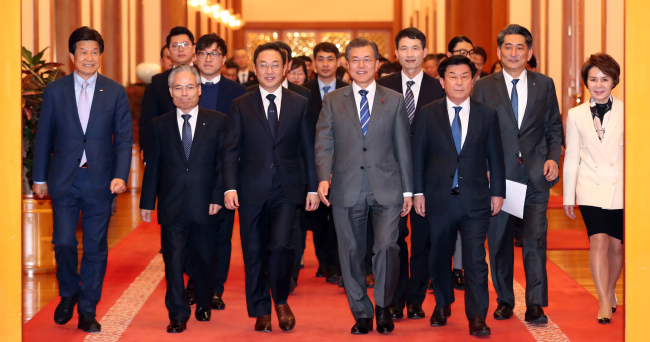President Moon Jae-in promised all-out effort Tuesday to support small and medium-sized enterprises (SMEs), saying his top priority was to allow them to work in a fair environment.
In a special meeting with top executives and officials from local SMEs and venture firms, the president said the government was also moving to discontinue the use of promissory notes as a way of payment by large conglomerates, a practice long blamed as a cause of liquidity shortages for already cash-strapped SMEs.

Moon highlighted the importance of SMEs, noting they were responsible for most jobs and income among citizens.
"Since last year, the government has been working to shift the paradigm of our economy to a people-oriented economy. This was to make sure the benefits of economic growth will reach all of our people and not just large export companies," he said.
The president earlier noted that 3.54 million SMEs accounted for 99 percent of all private businesses and 88 percent of employment in the country.
"Again, the government will push forward such policy initiatives without fail this year. In addition, it will focus on making sure its key policies can be felt by SMEs in the field," he said.
Government support for SMEs will include financial incentives for new jobs they create, the president noted.
Initially, the government offered to pay the salary of every third new employee a company hires. It will now provide an additional one third of wages for each new employee after the initial three. For instance, a company that hires four new employees will be reimbursed the full cost of one new employee and one third of the wage of the fourth new worker, he said.
The government will also help turn the existing production facilities of SMEs into smart factories.
President Moon noted the recent spike in the minimum wage may have especially placed a heavy burden on small shop owners and SMEs, who mostly rely on low-wage workers, but he insisted it was a necessary change to ensure the growth, as well as survival, of the local economy, including the SMEs themselves.
"A minimum wage hike is what we must have to reduce polarization, ensure humane lives of low-income workers and enable income-led growth. Once the minimum wage increase makes a safe landing, domestic demand will expand, as it will increase spending and our economy will improve. Eventually, it will help SMEs and small shop owners as well," he said.
The country's minimum hourly wage jumped 16 percent to 7,530 won (US$7.07) at the start of this year. Moon has pledged to raise the minimum wage to 10,000 won before his single five-year term ends in 2022.
The president said the government was also set to announce additional support measures for SMEs in the near future that will include a reduction in credit card processing fees for small shops. (Yonhap)





